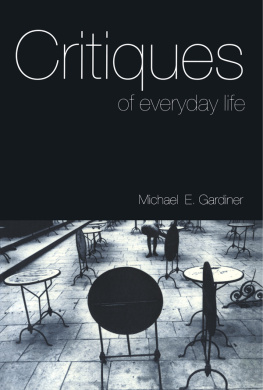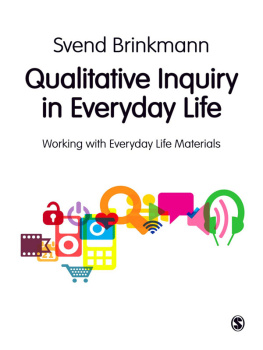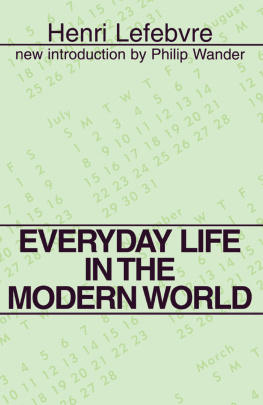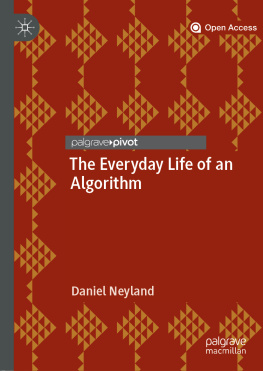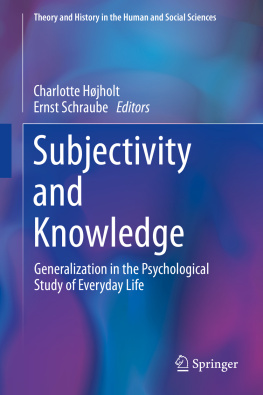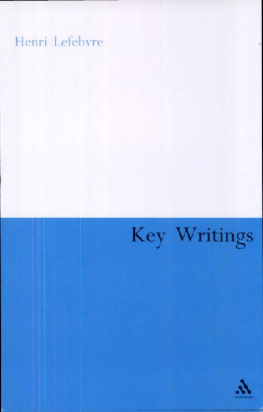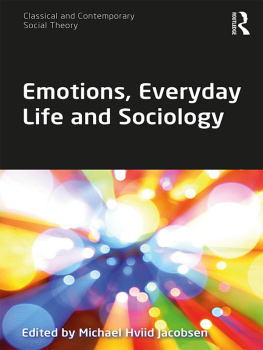CRITIQUES OF EVERYDAY LIFE
Everyday life is fast becoming a key concept within the social sciences and humanities. In this contemporary and highly relevant new book, Michael E. Gardiner proposes that there exists a counter-tradition within everyday life theorizing. This counter-tradition has sought not merely to describe lived experience, but to transform it by elevating our understanding of the everyday to the status of a critical knowledge.
In his analysis Gardiner engages with the work of a number of significant theorists and approaches, including:
The French tradition of everyday life theorizing, from the Surrealists to Henri Lefebvre, and from the Situationist International to Michel de Certeau
Agnes Heller and the relationship between the everyday, rationality and ethics
Carnival, prosaics and intersubjectivity in the work of Mikhail Bakhtin
Dorothy E. Smiths feminist perspective on everyday life.
Critiques of Everyday Life demonstrates the importance of an alternative, multidisciplinary everyday life paradigm and offers a myriad of new possibilities for critical social and cultural theorizing and empirical research.
Michael E. Gardiner is Associate Professor of Sociology at the University of Western Ontario.
First published 2000
by Routledge
Published 2014 by Routledge
2 Park Square, Milton Park, Abingdon, Oxon OX14 4RN
711 Third Avenue, New York, NY 10017, USA
Routledge is an imprint of the Taylor & Francis Group, an informa business
Transferred to Digital Printing 2005
2000 Michael E. Gardiner
Typeset in Garamond by
Exe Valley Dataset Ltd, Exeter
All rights reserved. No part of this book may be reprinted or reproduced or utilized in any form or by any electronic, mechanical, or other means, now known or hereafter invented, including photocopying and recording, or in any information storage or retrieval system, without permission in writing from the publishers.
British Library Cataloguing in Publication Data
A catalogue record for this book is available from the British Library
Library of Congress Cataloging in Publication Data
Gardiner, Michael, 1961
Critiques of everyday life/Michael Gardiner.
p. cm.
Includes bibliographical references and index.
1. Life. 2. Social historyPhilosophy. 3. SociologyPhilosophy.
4. Lefebvre, Henri, 1905. 5. Bakhtin, M. M. (Mikhail Mikhaaelovich),
18951975. 6. Heller, Agnes., I. Title.
BD435. G34 2000
ISBN: 978-0-415-11314-4 (hbk)
ISBN: 978-0-415-11315-1 (pbk)
FOR RITA
CONTENTS
This book has been the product of a rather long period of gestation, interrupted at various points by factors bodily and psychological, as well as numerous changes in institutional affiliation. I would like to thank a number of people at several institutions, not so much for their specific input into this project, but for their unstinting goodwill and moral and intellectual support at various junctures in my career over the last ten years or so: Barry Sandy well, the late Arthur Brittan and Phil Stanworth at the University of York; Arthur W. Frank and Tom Langford at the University of Calgary; Peter Baehr, Volker Meja and Ron Schwartz at Memorial University of Newfoundland; and finally Bob Barsky, Danile Blanger, Lori Davies, Julie McMullin, Mireya Folch-Serra, Clive Thomson and especially Chuck Levine at my present home, the University of Western Ontario. I would also like to thank my wonderful parents, George and Mary Gardiner, and express my love and gratitude to my wife and partner, Rita, to whom this book is dedicated and without whom it would never have been completed. I would like to credit Chris Rojek with helping to formulate the specific framework of this project, and to thank Mari Shullaw, the current Sociology editor at Routledge, for her remarkable patience and timely advice. I also thank the anonymous reviewers for their useful comments and constructive criticisms regarding an earlier draft manuscript. Finally, I acknowledge with gratefulness the funding of a Social Science and Humanities Council of Canada post-doctoral grant, which facilitated the research and writing of a number of core chapters in this book.
It is time to wake up, to revive the slogan which, a quarter of a century ago, in May 1968, echoed through the streets of Paris, time to be realistic enough to ask for the impossible, for what our system, its high priests and pundits, its propaganda machine and its mass media have as their task to describe as impossible or, if you prefer, dangerously utopian.
Daniel Singer
Only he who, by decision, has made his dialectical peace with the world can grasp the concrete.
Walter Benjamin
The everyday is platitude (what lags and falls back, the residual life with which our trash cans and cemeteries are filled: scrap and refuse); but this banality is also what is most important, if it brings us back to existence in its very spontaneity and as it is lived in the moment when, lived, it escapes every speculative formulation, perhaps all coherence, all regularity. Now we evoke the poetry of Chekhov or even Kafka, and affirm the depth of the superficial, the tragedy of nullity. Always the two sides meet (the amorphous, the stagnant) and the inexhaustible, irrecusable, always unfinished daily that which escapes forms or structures (particularly those of political society: bureaucracy, the wheels of government, parties). And that there may be a certain relation of identity between these two opposites is shown by the slight displacement of emphasis that permits passage from one to the other, as when the spontaneous, the informal that is, what escapes forms becomes the amorphous and when, perhaps, the stagnant merges with the current of life, which is also the movement of society.
Maurice Blanchot
When referring to the phenomenon of everyday life, the great French sociologist and philosopher Henri Lefebvre was fond of mentioning G. W. F. Hegels maxim The familiar is not necessarily the known. By invoking this cryptic phrase, Lefebvre was striving to put his finger on something that, partly by virtue of its very pervasiveness in our lives, remains one of the most overlooked and misunderstood aspects of social existence. Although he was convinced that critical sociological analysis could shed considerable light on the nature of the everyday and highlight the central role it plays in the social world, Lefebvre was equally certain that there would always remain something fundamentally mysterious and obscure about its workings. Mysterious, yet at the same time substantial and fecund, everyday life is the crucial foundation upon which the so-called higher activities of human beings, including abstract cognition and practical objectifications, are necessarily premised. Accordingly, we must be concerned with redeeming its hidden and oft-suppressed potentials. Rather than compare moments of human creativity to lofty mountain-tops and equate everyday life with plains or marshes, Lefebvre submits that a far better metaphor is to construe the everyday as fertile humus, which is a source of life-enhancing power as we walk over it unnoticed. A landscape without flowers or magnificent woods may be depressing for the passer-by, he writes, but flowers and trees should not make us forget the earth beneath, which has a secret life and a richness of its own (1991a: 87).
This is a book about theories of everyday life, the largely taken-for-granted world that remains clandestine, yet constitutes what Lefebvre calls the common ground or connective tissue of all conceivable human thoughts and activities. It is the crucial medium through which we enter into a transformative praxis with nature, learn about comradeship and love, acquire and develop communicative competence, formulate and realize pragmatically normative conceptions, feel myriad desires, pains and exaltations, and eventually expire. In short, the everyday is where we develop our manifold capacities, both in an individual and collective sense, and become fully integrated and truly
Next page
